Embarking on the journey of starting an online business in 2025 presents unparalleled opportunities. With advancements in technology and the proliferation of digital tools, entrepreneurs can launch ventures with minimal upfront costs and reach global audiences. Whether you’re a young adult exploring side hustles or an aspiring entrepreneur aiming for a full-fledged enterprise, this comprehensive guide will navigate you through the essential steps to establish a successful online business.
1. Identify a Profitable Business Idea

Begin by pinpointing a business idea that aligns with your passions and market demand. Consider the following models:
- E-commerce Store: Selling physical products through platforms like Shopify or Amazon.
- Digital Products: Offering e-books, courses, or software.
- Affiliate Marketing: Promoting other companies’ products and earning commissions.
- Dropshipping: Selling products without holding inventory, where suppliers handle fulfillment.
Conduct market research to assess demand, competition, and profitability. Tools like Google Trends and keyword research can provide insights into trending niches.
2. Conduct Thorough Market Research

Understanding your target audience is crucial. Identify their needs, preferences, and purchasing behaviors. Analyze competitors to determine market gaps and opportunities. Surveys, interviews, and social media polls can yield valuable information about potential customers’ pain points and desires.
3. Develop a Comprehensive Business Plan

A well-structured business plan serves as a roadmap for your venture. Key components include:
- Executive Summary: Overview of your business objectives.
- Market Analysis: Insights into industry trends and target demographics.
- Marketing Strategy: Plans for promoting your products or services.
- Financial Projections: Estimates of revenue, expenses, and profitability.
- Utilize templates and tools to streamline the planning process.
4. Choose a Memorable Business Name and Register Your Domain

Select a business name that reflects your brand identity and is easy to remember. Ensure the corresponding domain name is available and register it through reputable providers. A cohesive brand name and domain enhance credibility and recognition.
5. Set Up Your Online Presence

Establishing a professional online presence is vital. Depending on your business model:
- E-commerce Platforms: Utilize platforms like Shopify or WooCommerce to build your store.
- Website Builders: Use tools like Wix or Squarespace for service-based businesses.
Ensure your website is mobile-responsive, user-friendly, and optimized for search engines. Incorporate essential pages such as About Us, Contact, and Privacy Policy.
6. Implement Secure Payment and Fulfillment Systems

Integrate reliable payment gateways like PayPal, Stripe, or local options to facilitate transactions. For product-based businesses, establish efficient fulfillment processes:
- In-House Fulfillment: Manage inventory and shipping internally.
- Third-Party Logistics (3PL): Outsource storage and shipping to specialized providers.
- Dropshipping: Partner with suppliers who handle inventory and delivery.
Ensure transparency in shipping times and costs to build customer trust.
7. Develop a Strategic Marketing Plan

Promoting your business effectively is key to attracting and retaining customers. Consider the following strategies:
- Search Engine Optimization (SEO): Optimize your website content to rank higher in search results.
- Content Marketing: Create valuable content such as blogs, videos, or podcasts to engage your audience.
- Social Media Marketing: Leverage platforms like Instagram, Facebook, and TikTok to reach potential customers.
- Email Marketing: Build an email list to nurture leads and promote offers.
Regularly analyze marketing metrics to refine your strategies and maximize ROI.
8. Ensure Legal Compliance and Financial Management

Adhering to legal requirements and maintaining sound financial practices are essential:
- Business Registration: Register your business with the appropriate government authorities.
- Licenses and Permits: Obtain necessary licenses based on your industry and location.
- Tax Compliance: Understand and fulfill tax obligations, including sales tax collection.
- Financial Tracking: Use accounting software to monitor income, expenses, and profitability.
Consult with legal and financial professionals to ensure compliance and optimal financial health.
9. Launch and Continuously Optimize

With all systems in place, launch your online business. Monitor performance metrics such as website traffic, conversion rates, and customer feedback. Use this data to make informed decisions and implement improvements. Stay adaptable and open to evolving strategies to meet changing market demands.
10. Scale Your Business Strategically

As your business grows, explore opportunities to scale:
- Product Expansion: Introduce new products or services to diversify offerings.
- Market Penetration: Target new customer segments or geographic regions.
- Partnerships: Collaborate with other businesses to expand reach.
- Automation: Implement tools to streamline operations and improve efficiency.
Regularly revisit your business plan to align with growth objectives and market trends.
Final Thoughts
Starting an online business in 2025 is more accessible than ever, thanks to technological advancements and a wealth of resources. By following these structured steps and remaining committed to continuous learning and adaptation, you can build a thriving online enterprise. Embrace the entrepreneurial journey with confidence and resilience.
Read this Next:
1 Better Economy: The Power of Financial Education at Any Age
2 Best Free Mobile Games that are Addictive in 2025
3 The Best Films and Series That Mix Romance and Fantasy
4 The Ultimate Guide to Quality Sleep that Will Make Your Life Better
5 Easy Extra Income Options That Need Minimal Investment

© YourCoinBlox. Not to be reproduced without perm


6 thoughts on “How to Start an Online Business: Steps for New Entrepreneurs”
Goal11casinologin, now that sounds like a winner! Let’s score some goals and have some fun! C’mon, luck be a lady tonight! goal11casinologin
Okay, so sv388onlineborneo303… long name, I know. But is it any good? Anyone playing there regularly? Lay it on me! Check out the site: sv388onlineborneo303
If you like the classics, classicslots777 is the place to be. It is a simple place with traditional slots, without much fuss. Enjoy the retro vibes at classicslots777!
bet333casino has some good points. The variety of games is decent, and I managed to snag a small win. No major complaints so far. Head to bet333casino to try your luck.
7075game is a solid option if you’re looking for a quick game session. Easy to pick up and play, nothing crazy complicated. Have a look at 7075game.
1993betvip, eh? Trying out the VIP thing. Not bad, got a small bonus right off the bat. The site design felt a little dated to me, though. See what you think at 1993betvip.